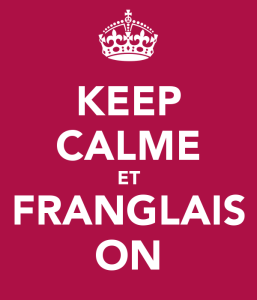I am going cold turkey on Quora. It was taking too much of my writing time, and beginning to be too emotionally involving. Like the XKCD (there's always an XKCD) I shouldn't waste my passion worrying about "someone (being) wrong on the internet."
Still reading about French slang and trying to figure out a good way of crossing the divide here. I am writing for an English-speaking and presumed monoglot reader. I am writing with a protagonist who is traveling across the world but -- unlike her alter-ego, which she points out in this book -- doesn't speak all those languages.
So first there's the coincidence of running into convenient English speakers whenever the plot needs them. Worse; I am using these people to give info-dumps, so there is a real pressure to have them speaking clearly and efficiently.
On top of that, I construct dialogue from the logic of the conversation. I don't have a good method to work outwards from the ways a particular speaker may engage, which means I too often end up with everyone sounding identical. There's only so much you can do coming back through during the editing pass and changing a few verbs around.
I still feel there is this association too many of us make that broken English = inferior mentality. Too many years of being basically told that by teachers; if you didn't speak right, you were a failure and needed to study harder. Reality is that broken English is probably the most common language in the world.
The new lingua franca, although that doesn't piss the French Academy off as much as their local people speaking it.
But it gets worse. The language that my protagonist is most likely to run into is patois, street speak, which is a slangy mix of multiple languages and new coinages. It is youth speak, meaning full of tribal identifiers and ways to detect outsiders, and thus also changing rapidly.
And it is also a sort of jazz; spoken by people with a good general grasp of the grammar of at least two languages, allowing them to creatively remix. So hard for an outsider to pick up. Even harder for the reader -- who isn't going to be living there being exposed to it constantly.
I should know. I'm still having a hell of a time understanding half the people in The Expanse.
So, yeah, it does get done in major media. But it still sticks in my craw to do broken English with random French words in it.
And, yes, I'm reading about the protests as well. During searches for discussions of Franglais found a blog that covers the period my book is set in.
But I'm trying not to get too much into that stuff. There is plenty of protests and all that Les Mis stuff in the historical period I'm trying to emphasize.
But now I'm working on the first scene of the Steampunk Cabaret...





No comments:
Post a Comment